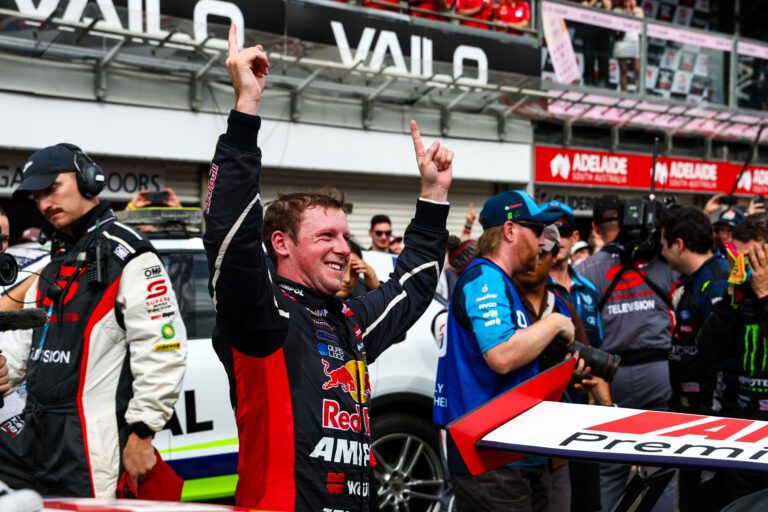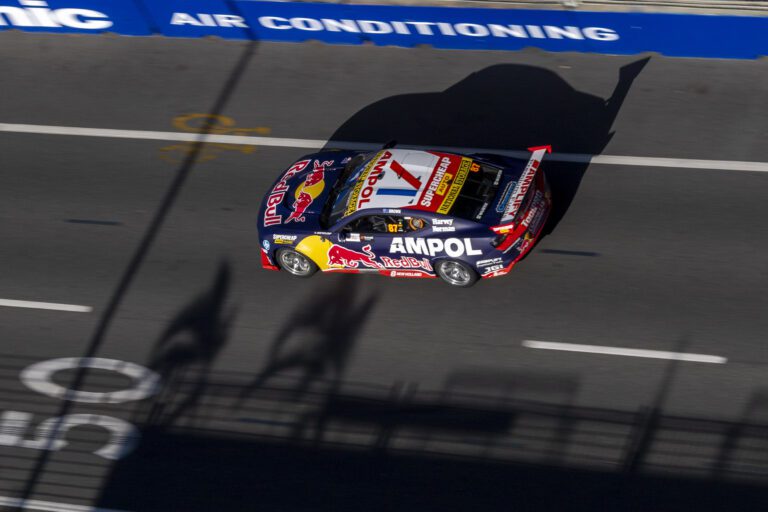Here at the Red Bull Holden Racing Team we’re always keen to nurture the talent of tomorrow. Sure, we’re constantly on the lookout for the next Adrian Newey or Ross Brawn to hopefully lure to the team, but it goes deeper than that – it’s about inspiring future generations of engineers, mechanics, fabricators, machinists and more, to consider the crazy world of motorsport as a genuine and achievable career choice.
On Wednesday evening we opened the doors of Triple Eight HQ to 20 Year 12 students attending the National Youth Science Forum Next Step program to show them what life is like away from the television cameras of pit lane. Some are rev-heads, others have never watched a single lap of racing in their lives, but they all have one thing in common – a passion to turn their love of science into an exciting and rewarding career. Motorsport definitely ticks those boxes!


With Mark “Dutto” Dutton (Team Manager), David Cauchi (car #1 Race Engineer and Head Designer), Romy Mayer (car #1 Data Engineer), Kris Goos (Workshop Manager and RBHRT Crew Chief) and Pete Ringwood (car #888 Data Engineer) doing a fine job of representing Triple Eight, the students were given the opportunity to ask their burning questions before being taken on guided tours of the factory.
READ MORE: How to become an engineer
“We work in an unbelievably cool environment, but not enough students at this age realise that it’s a real career option for them,” said Dutto.
“A lot of them had no idea about Supercars or motorsport at all, so it was great to see their eyes light up and see them get excited about the whole process of engineering, from designing a part, to building it and putting it on the car, then seeing it perform on track and all the teamwork that goes into that.
“Hopefully they’ve got the bug for it now, then maybe we’ll see some of them pop up in a few years’ time after university with a CV looking for a job in Supercars.”
Don’t just take our word for it though. By the time the students left, they were buzzing. And no, that wasn’t only down to the Red Bull cans Dutto was handing out.
“It was utterly fantastic, I really enjoyed it,” said Phoebe McAuliffe. “I’m really interested in engineering, but I hadn’t considered motorsport as an area I could get involved in. Seeing the whole production process and how the engineers are involved completely from start to finish, not just at the design stage, and they get to see their entire idea, I think that’s a really cool thing.”


The experience gave Rose Donnelly an entirely new view of engineering: “The team at Triple Eight was telling us how it is an art form, and I can truly understand and appreciate that after seeing the work and dedication that goes into building a car from the ground up, and all the components that need to be considered in the process. It truly has given me a better appreciation for the sport and a deeper understanding as to where a degree in engineering can take you.”
READ MORE: Inspiring the female talent of tomorrow
Alexandra Bartetzko found it gave her a similar appreciation of the sport. “It was really amazing to see many intelligent scientists and scientific disciplines come together to create a very positive and friendly environment, as well as the beautiful cars that were a work of art,” she said.
“I discovered technologies that I never knew existed and have a newfound appreciation for the artistry that occurs behind the impressiveness of the races.”
This was echoed by Jordan Karim, who said, “It was very eye-opening as I never realised that motorsport was such an interdisciplinary industry with physicists, engineers, mechanics, commercial, business and of course the drivers. It was very fascinating to see that motorsports have a lot more work behind the scenes than just what you can watch on TV.”
For some, like Alex Young, it was seeing the tiny little details of what we do that really put the cherry on top. “It was really interesting to see just how much effort and precision has to go into each individual little piece of the machine. Even though [a part] may just be a little bit over in weight, all that can add up and then completely ruin [the car]. Or the opposite – you can take off little bits here and there and you can get a much faster vehicle, and how much that impacts it overall.”
Here’s hoping this little taste of life in the fast lane has sparked some inspiration within the next generation of engineers.
























